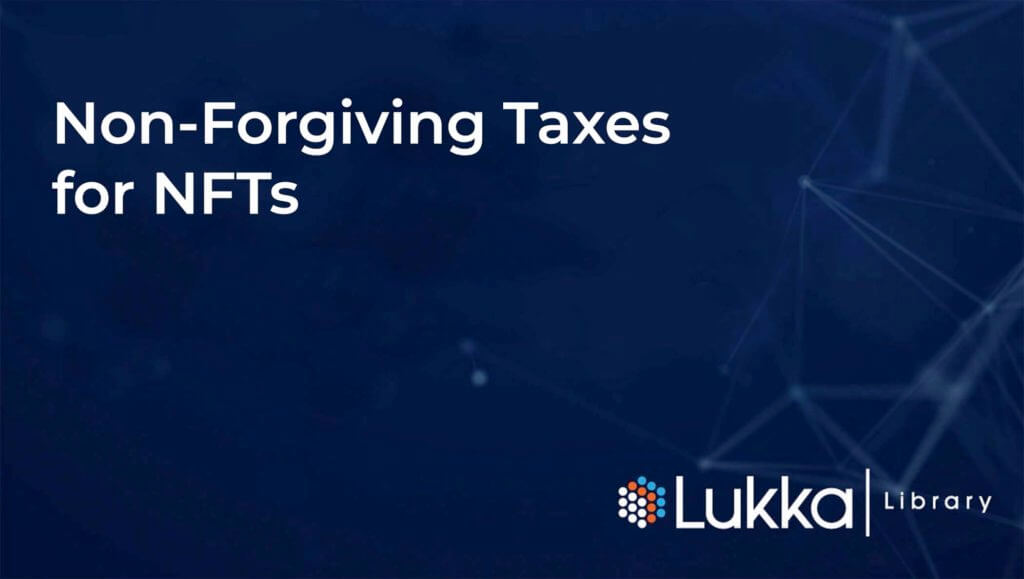Updated April 2022
Author: Olya Veramchuk, Director of Tax Solutions in Tax & Regulatory Affairs
Not long ago, most people would have needed to Google what a non-fungible token (“NFT”) was. Generally, it is a digital representation of certain rights associated with an asset or experience that exists on a blockchain.
Today, not a week goes by without an announcement about new NFTs being launched by artists, athletes, New York Times columnists, and anyone in between, or NFTs selling for large amounts of money on a secondary market. Some of the latest examples are Visa’s purchase of a CryptoPunk for $150,000 and a 12-year old coder making $400,000 on sales of pixelated whales.
This is not entirely surprising, given that collecting things is part of human nature, and the timing for virtual collectibles seems particularly appropriate after a year and a half of virtual working environments being the norm. Many skeptics speculate that NFTs are yet another bubble that will inevitably burst. Others maintain that practical NFT use cases are limitless and will far surpass the current frenzy over Ethereum rocks, CryptoPunks and Pudgy Penguins.
Whatever side of the spectrum one may be on, it is essential to understand the tax issues that come along with all life stages of an NFT. This is particularly important for NFT creators, who should consider whether minting NFTs is their business or just a hobby, understand intangible property rules, satisfy reporting obligations, and face state and local tax issues. NFT buyers need to remember that not only selling but also buying an NFT is a taxable transaction. This is because NFTs are purchased with cryptocurrency, mainly ETH, and therefore each transaction is viewed by the Internal Revenue Service (“IRS”) as a property-for-property exchange, as discussed in more detail below. NFT traders should also consider how the income earned should be characterized depending on their activities. Although the IRS has yet to issue any digital asset-specific guidance, let alone NFT-specific guidance, existing rules could be applied to analyze tax implications from the perspective of different market participants.
Tax Considerations for NFT Creators
While creating an NFT does not bear tax consequences in and of itself, it is vital to differentiate between doing it as a hobby or as a trade or business. This is because someone minting NFTs for a living would be able to deduct or capitalize and amortize costs (e.g., materials, gas fees, etc.) incurred in the process. They may also be eligible for the qualified business income deduction. However, any income realized on a disposition of an NFT would be subject to self-employment tax, in addition to the regular business income tax. By contrast, someone minting NFTs as a hobby would not be able to deduct expenses or take advantage of other potentially available deductions, but they would not be liable for self-employment tax, either. Whether someone is in a trade or business of minting NFTs or doing it as a hobby, any realized income would have ordinary character.
As mentioned above, an NFT is a digital certificate of certain rights associated with an asset. Therefore, when a creator sells an NFT, it is important to understand whether they have transferred all of the rights for a given NFT or just some limited rights (i.e., have retained the copyrights). The first instance would be treated as a sale for tax purposes. The creator’s realized ordinary income would be offset with the basis in the NFT, subject to certain limitations. If only limited rights are transferred, the transaction would be treated as a licensing agreement, entitling the creator to royalty income, including any from future sales of the NFT on the secondary market. Technically, if royalties are paid to a foreign person, they may be subject to withholding taxes, and the payor (i.e., the current NFT holder) would be the party liable for withholding the tax and transmitting it to the IRS. However, it is not very clear at the moment how this could be executed in practice, given the decentralized nature of digital assets and the inherent lack of visibility to the transaction counterparty.
Tax Considerations for NFT Investors
Despite the lack of guidance from the IRS, many industry participants treat NFTs as capital assets, the disposition of which would generate short or long-term capital gains and losses, depending on the holding period of the NFT. Still, it is important to remember that because NFTs are acquired with cryptocurrency, which the IRS declared to be property, then for tax purposes, each NFT acquisition and disposition is a taxable event since it is considered to be a property for property exchange. The buyer would need to know the basis and the holding period of the cryptocurrency used to buy an NFT to calculate the tax liability on the purchase leg of the transaction. When the buyer decides to dispose of the NFT, they need to compare their basis in the NFT to the market price of the cryptocurrency they accepted as a payment for the NFT. In both cases, the holding period would dictate whether the gains or losses should be short-term (for assets held under a year) or long-term (for assets held over a year). In addition, realized gains may be subject to the Net Investment Income Tax (“NIIT”) of 3.8%. NIIT is levied on investment income, which includes, among other things, capital gains. However, this tax is generally relevant to high-income earners because it would only apply in instances where a taxpayer’s modified adjusted gross income goes over a certain threshold.
There is a nuance for the NFT buyers who are digital art dealers by trade. Because they are in a trade or business of buying and selling NFTs, the assets they hold would be treated as inventories, and any realized gains or losses would be of ordinary character.
In addition, current tax law considers works of art, among other things, as collectible items. Such assets are subject to a special collectibles long-term capital gains rate, which is higher than the general capital gains rate. Many industry participants believe that some NFTs could be considered works of art and should be treated as collectible items. Again, regardless of the classification, where an NFT is held for less than a year, a regular short-term capital gains rate would apply.
Lastly, NFTs are generally purchased with hopes of appreciation, unless, of course, someone really believes in a particular project or admires a particular artist. But not every launch is successful, and not every asset goes up in value, with some NFTs becoming worthless. Taxpayers may be able to take a worthless deduction on their returns, assuming they are able to prove that the asset is truly worthless.
State and Local Tax Considerations for NFTs
All of the tax issues discussed above are covered by the federal tax umbrella. However, individual states also want their share of the pie – and that’s where things get even more complicated. If the federal government is struggling with putting forward meaningful guidance for digital assets, then state and local tax authorities are struggling even more. Moreover, any limited guidance issued by a particular state is likely rendered useless in another state due to the differences in state and local tax laws.
Some states impose income taxes. Generally, such states follow federal tax principles to compute taxable income. Resident individuals then get taxed on all of their taxable income. Nonresident individuals and corporations get taxed on taxable income sourced to the state. Some states impose sales and use taxes. Sales tax is typically imposed by the jurisdiction where a sale has occurred, and use tax is charged where the good or service is consumed. Levying such taxes on tangible personal property and services is much easier than on digital assets – again, due to the fundamental differences between digital assets and tangible property.
Therefore, those in a trade or business of selling NFTs would likely need to go through a challenging exercise of determining the source of income related to their NFT activities and then appropriately apportion it to the relevant states or establish where they would be subject to sales and use taxes. As discussed earlier, absent any guidance from the tax authorities, solving a sourcing puzzle in the context of decentralized digital assets transactions would quite possibly prove to be futile. Luckily, Lukka has a variety of resources to help you in your crypto education. Lukka Library is a content database filled with articles, educational resources, and position papers from some of the industry’s foremost thought leaders on crypto tax, regulation, and many other subjects. If you’re looking for a software solution to help you manage your crypto assets, including NFTs, Lukka can help with infrastructure specifically designed for the intricacies of blockchain and crypto data. LukkaTax for Professionals is a crypto tax software for CPAs and tax professionals that need to assist their clients with filing crypto taxes, and Lukka Essentials allows individuals to manage their crypto portfolio and calculate crypto taxes.


